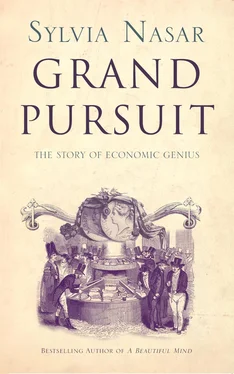Meanwhile, as heads of state and other dignitaries swooped into town, Scotland Yard was keeping a close eye on radicals. Judging by a report from a Prussian government spy, the main threat posed by Marx was to Mrs. Beeton’s standards of housekeeping:
Marx lives in one of the worst, therefore one of the cheapest quarters of London. He occupies two rooms. The one looking out on the streets is the salon, and the bedroom is at the back. In the whole apartment there is not one clean and solid piece of furniture. Everything is broken, tattered and torn, with a half inch of dust over everything and the greatest disorder everywhere. In the middle of the salon there is a large old fashioned table covered with an oil cloth, and on it lie manuscripts, books and newspapers as well as the children’s toys, the rags and tatters of his wife’s sewing basket, several cups with broken ribs, knives, forks, lamps, an inkpot, tumblers, Dutch clay pipes, tobacco ash—in a word everything is topsy-turvy and all on the same table. A seller of second hand goods would be ashamed to give away such a remarkable collection of odds and ends. 92
The Exhibition season represented a new nadir in Marx’s affairs. Though he adored his wife, he had carelessly gotten Helen Demuth, her personal maid and the family housekeeper, pregnant. Jenny, who was pregnant as well, was beside herself. Three months after she gave birth to a sickly girl, the family’s housekeeper delivered a bouncing baby boy. To quash the “unspeakable infamies” about the affair already circulating around gossipy émigré circles, Marx had his newborn son whisked off to foster parents in the East End, never to see him again. “The tactlessness of some individuals in this respect is colossal,” he complained to a friend. 93The boy’s mother stayed behind to care for the Marx family as before. With home more unbearable than ever, Marx hurried to seat number G7 every morning and stayed until closing.
By the time the Great Exhibition opened on May Day of 1851, Marx had already begun to doubt that the modern Rome would be overthrown by her own subjects. Instead of Chartists storming Buckingham Palace, four million British citizens and tens of thousands of foreigners invaded Hyde Park to attend the first world’s fair. The human wave helped launch Thomas Cook in the tour business and brought people of all backgrounds together. “Never before in England had there been so free and general a mixture of classes as under that roof,” crowed one of the many accounts of the fair published at the time. 94For Marx, the fair resembled the games Roman rulers staged to keep the mob entranced. “England seems to be the rock which breaks the revolutionary waves,” he had written in an earlier column for the Neue Rheinische Zeitung. “Every social upheaval in France . . . is bound to be thwarted by the English bourgeoisie, by Great Britain’s industrial and commercial domination of the world.” 95The Exhibition was meant to encourage commercial competition, which Prince Albert and some of its other sponsors hoped would foster peace. Marx had prayed for war: “Only a world war can break old England . . . and bring the proletariat to power.” 96The worse things got, he reasoned, the better the odds of revolution.
Still, he was not willing to totally discount the possibility that “the great advance in production since 1848” might lead to a new and more deadly crisis. Dismissing the Exhibition as “commodity fetishism,” he predicted the “imminent” collapse of the bourgeois order. 97As he and Engels had written in their Manifesto: “What the bourgeoisie therefore produces, above all, are its own grave-diggers.” 98
Racing against time so as not to be overtaken by the “inevitable” revolution—if not in England, then on the Continent—Marx began working furiously on his own book of Revelation, a critique of “what Englishmen call ‘The Principles of Political Economy.’ ” 99Marx spent most days scouring the reading room at the British Museum for material for his great work. To the contemporary questions “How much improvement in living standards was possible under the modern system of private property and competition?” and “Could it endure?” Marx knew the answers had to be negative. His challenge now was to prove it.
When he took up economics in 1844, Marx did not set out to show that life under capitalism was awful. A decade of exposés, parliamentary commissions, and Socialist tracts, including Engels’s, had already accomplished that. The last thing Marx wanted was to condemn capitalism on moral (that is to say Christian) grounds, as utopian Socialists such as Pierre-Joseph Proudhon, who claimed that “private property is theft,” had done. Marx had no intention of converting capitalists as his favorite novelist, Dickens, dreamed of doing with his Christmas Carol. In any case, he had long repudiated the notion of any God-given morality and insisted that man could make up his own rules.
The point of his great work was to prove “with mathematical certainty” that the system of private property and free competition couldn’t work and hence that “the revolution must come.” He wished to reveal “the law of motion of modern society.” In doing so, he would expose the doctrines of Smith, Malthus, Ricardo, and Mill as a false religion, just as radical German religion scholars had exposed biblical texts as forgeries and fakes. His subtitle, he decided, would be A Critique of Political Economy. 100
Marx’s law of motion did not spring Athena-like from his powerful, brooding mind, as his doctor friend Louis Kugelmann supposed when he sent Marx a marble bust of Zeus as a Christmas present. It was Engels, the journalist, who supplied Marx with the rough draft of his economic theory. Marx’s real challenge was to show that the theory was logically consistent as well as empirically plausible.
In the Manifesto, Marx and Engels had offered two reasons for capitalism’s dysfunction. First, the more wealth that was created, the more miserable the masses would become: “In proportion as capital accumulates, the lot of the laborer must grow worse.” Second, the more wealth that was created, “the more extensive and more destructive” the financial and commercial crises that broke out periodically would become. 101
While the Manifesto referred to “ever-decreasing wages” and “ever-increasing burden of toil” as matters of historical fact, in Das Kapital, Marx argued that the “law of capitalist accumulation” requires wages to fall, the length and intensity of the working day to rise, working conditions to deteriorate, the quality of goods consumed by workers to decline, and the average life span of workers to fall. He did not, however, fall back on the second of his arguments about ever-worsening depressions. 102
In Das Kapital, Marx specifically rejected Malthus’s law of population, which, as it happens, is also a theory of how the level of wages is determined. In formulating his law, Malthus had assumed that pay was strictly a function of the size of the labor force. More workers meant more competition among them, hence lower wages. Fewer workers meant the opposite. Engels had already identified the primary objection to Malthus in his 1844 “Outlines of a Critique of Political Economy,” namely that poverty could afflict any society, including a Socialist one.
Marx’s edifice rests on the assumption that all value, including surplus value, is created by the hours worked by labor. “There is not a single atom of its value that does not owe its existence to unpaid labor.” In Das Kapital, he cites Mill to support his claim:
Tools and materials, like other things, have originally cost nothing but labour . . . The labour employed in making the tools and materials being added to the labour afterwards employed in working up the materials by aid of the tools, the sum total gives the whole of the labour employed in the production of the completed commodity . . . To replace capital, is to replace nothing but the wages of the labour employed. 103
Читать дальше












